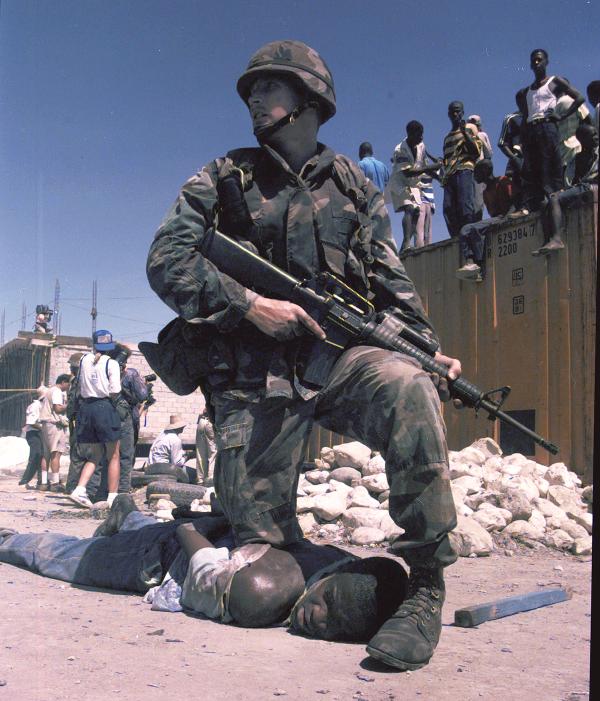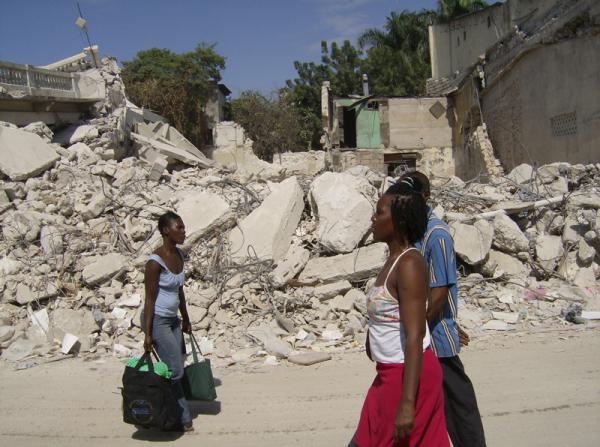
Armed Marine kneels on back of a Haitian during 1994 U.S. occupation of Haiti. Photo: AP
Over recent months, news reports out of Haiti have shined a light on an unfolding crisis that is bringing tremendous suffering to the masses of people today, and creating grave anxiety about the future.
The big news in the U.S. was the kidnapping of 17 American and Cantreasadian missionaries (plus their Haitian driver) on October 16 by the “400 Mawozo” gang, which is now demanding 17 million dollars in ransom. But Haiti has been plagued by powerful criminal gangs for years, and the problem has gotten much worse since the July 7 assassination of President Jovenel Moïse by a squad of mercenaries hired by forces as-yet-unknown.
Moïse, and his predecessor, President Michel "Micky" Martelly, had built up these gangs as a weapon against ruling class rivals, and as a means to control the millions of oppressed Haitians living in the vast slums in the capital of Port au Prince. The New York Times described a 2018 massacre in the La Saline slum, led by a Haitian police sergeant (who now leads the powerful “G9” gang and goes by the name “Jimmy Barbecue”):
They raped women, burned homes and killed dozens of people, including children, chopping up their bodies with machetes and throwing their remains to pigs.
The gruesome massacre three years ago, considered the worst in Haiti in decades … was organized by senior Haitian officials, who provided weapons and vehicles to gang members to punish people in a poor area protesting government corruption, the U.S. Treasury Department announced last year.
While all this was going on—fully understood by the U.S.—both the Trump and Biden administrations firmly backed the Moïse regime, even when he refused to hold elections after his legal term expired and insisted on remaining in office.
From the standpoint of the U.S., Moïse was maintaining “order” in Haiti—the fact that it was at the price of incredible suffering, or that he was notoriously corrupt, skimming vast amounts of foreign aid money for himself and his allies—was not a concern.
This is consistent with the U.S. role in Haiti for over a century, since the U.S. invaded and occupied Haiti for 19 years, starting in 1915. From 1957 to 1986 the U.S. backed the hated dictatorships of first François (Papa Doc) Duvalier and then Jean-Claude (Baby Doc) Duvalier, known around the world for torturing and killing anyone who expressed even the mildest dissent. When the masses overthrew Baby Doc in 1986, the U.S. pushed doggedly to stabilize one lackey after another. And when, in spite of this, the reformist Jean-Bertrand Aristide was overwhelmingly elected president, the U.S. squeezed and fought him at every turn, finally orchestrating a coup that overthrew him.
So Moïse was another in the line of hated and corrupt U.S.-backed oppressors. Nevertheless, his death has made conditions in Haiti even worse. Because of the ongoing political crisis,1 there was no recognized “legitimate” successor to Moïse. After two weeks of confusion, the U.S. and other big powers orchestrated the July 20 installation of Ariel Henry (a close Moïse ally) as the “Acting President.”
But the upshot has been a power vacuum that the gangs have stepped into—reportedly they are now better armed, more numerous and better organized than the Haitian police, control more than half of the capital city, and are vying to control the national government.
Kidnappings for ransom, which once targeted mainly members of Haiti’s small middle class, are now rampant. Impoverished street vendors are kidnapped for the fifty dollars their families might be able to raise. Children are kidnapped out of classrooms. Priests—once “off limits”—are kidnapped out of their churches.
When a major earthquake hit southern Haiti in mid-August, relief supplies from the capital were stopped at gang checkpoints. And in the last few weeks, the G9 gang has shut down the port, cutting off shipments of crucial supplies, including gasoline. The owner of several gas stations reports that he is receiving only 9,000 gallons of gas a month, down from 35,000 gallons a week previously.

In 2010 Haiti suffered a 7.0 earthquake that caused enormous damage. Photo: revcom.us
Because Haiti’s electric power grid never recovered from the massive 2010 earthquake, much of the country—including hospitals—depends on gas-fueled generators. With supplies down to a trickle, the country is on the brink of collapse. Hospitals are down to a few days' supplies to be able to operate life-saving machinery like providing oxygen; doctors, nurses and families of patients sleep in the hospitals because there are no cars or cabs to enable them to travel back and forth. The few fuel trucks leaving the capital are stopped in towns along the way and desperately needed fuel is siphoned off.
For decades the Haitian people have fought to survive and raise their families under impossible circumstances. And they have struggled with almost unfathomable courage and determination for political change that would enable their country and people to thrive. But all along they have been up against the power of the U.S., sometimes open, sometimes behind the scenes. As one activist put it, “The U.S. is Derek Chauvin’s knee on our neck.”
In spite of this bitter and inescapable reality, some voices—including the editorial board of the Washington Post—are actually calling for “international [in other words, U.S.-led military] intervention” to “establish a modicum of order and stability,” supposedly for “humanitarian” purposes. But all of history teaches that the U.S. is never a “force for good”—in Haiti or anywhere else—and that further intervention can only serve U.S. interests, not those of the Haitian people nor of humanity.
No one knows how this crisis will be resolved, and there is great and growing anxiety among the Haitian people and those around the world who care about them. But one thing is vividly clear—this crisis cannot be solved within the framework of imperialist domination. And as terrible as the current crisis is, the turmoil can also provide openings for a revolutionary path forward to be forged, if even a small number of people take up the science of revolution, the new communism developed by Bob Avakian, with determination and with their sights set firmly on a different and brighter future for the people of Haiti, and humanity as a whole.
